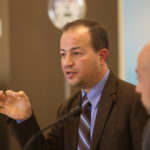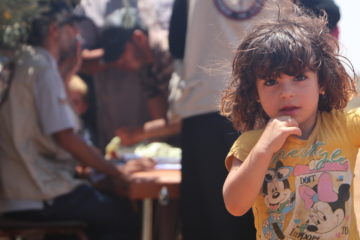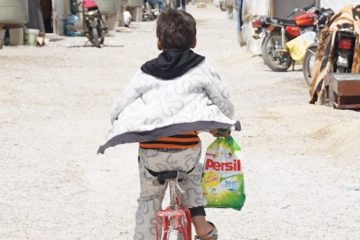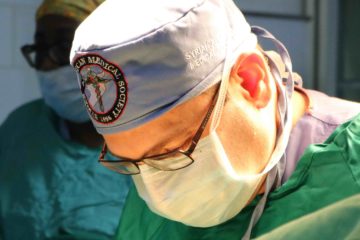September 12, 2014
On Wednesday night, President Obama addressed the nation and outlined his strategy to “degrade and ultimately destroy the terrorist group known as ISIL.” That strategy includes providing additional training and military assistance to the Syrian opposition and potentially authorizing airstrikes inside Syria. Dr. Zaher Sahloul, President of SAMS, spoke with WBEZ Worldview yesterday on how the policy changes will impact people inside Syria. Here is his interview.
WBEZ’s Worldview (WW): Dr. Zaher Sahloul is president of the Syrian American Medical Society. He has spent a lot of time in Washington during the last several years trying to get the U.S. to take further action in Syria in order to help the people who have been caught in the crossfire of the brutal civil war there. He has also spent a lot of time inside Syria itself and he is joining me now to talk about the President’s strategy, welcome back to Worldview Dr. Sahloul.
Dr. Sahloul: Thank you for having me.
WW: As someone who has spent a lot of time inside Syria since the war broke out, you know the people, you know the landscape, coming from that context, what’s your reaction to the strategy that the President laid out last night?
Dr. Sahloul: Well I’m happy that there is a strategy to deal with this crisis, that is frankly affecting mostly the Syrian people and the Iraqi people more than anyone else. Thousands of Syrians have been killed by ISIS, of course tens of thousands of Syrians have been killed by their own regime also, so I am happy that we have a strategy to deal with it. I was also hoping to hear more in the speech about ending the crisis and chaos in Syria, transitioning Syria into a democratic state, facilitating the aspirations of the young people of Syria, that are looking for jobs and opportunities and freedoms, partnering with civil society in Syria, because that is eventually what will defeat ISIS. ISIS is giving a message of death, we need to counteract with a message of hope and opportunity.
WW: So he didn’t really talk about that very much at all. He talked about continuing humanitarian aid. Do you think that the strategy he laid out last night can be effective without addressing what you say are those root causes?
Dr. Sahloul: As a short term, it is probably needed. You need to make sure that these groups are not gaining more ground and limit their influence. They themselves have a long term strategy to recruit more locals to their ideology and also foreigners to their ideology. The way to counteract that is by making sure, first of all that we support moderate civil organizations and groups inside Syria, help them to rebuild what has been destroyed. Help resettlement of the refugees and internally displaced people that are easy victims for these groups. We have more than nine million Syrians who are internally displaced and refugees, according to the United Nations statistics, and these are easy targets for these extremists. So I think emphasizing bombing and destroying, maybe it is needed, but i think the long term solution should be an inside solution with close collaboration between diaspora Syrian organizations and civil society inside Syria.
Alexandra: Can you talk more about the issue of recruitment? Obama didn’t spend a lot of time on that, he said we are going to try to stem the flow of foreign fighters into and out of the Middle East and that was really all he said about this aspect of recruiting young people. Can you just help to explain to people a little but more about what it is that is attracting so many young people inside Syria to ISIS and what is needed on a larger scale to combat that recruitment?
Dr. Sahloul: Let’s say you are an average young Syrian who lives in Aleppo, Idlib, or Raqqa, you have two choices. Either you are bombed by your own government everyday with barrel bombs, and this has been going for years now, it is documented and it is happening, or you have these groups that are providing you with jobs, with salaries, with food, and some type of stability and law and order. I think the young people in Syria are not different than the young people in our inner cities that sometime join gangs because they are providing them with support, with group dynamics, with solidarity, with money, and that’s what is happening. I would say that most Syrians who are joining these groups are joining for the money and stability and salary, not because they believe in their ideology. Their ideology is very twisted and they are looked at by the mainstream Muslim communities as outsiders. This ideology of ISIS is called throughout Islamic history is called the Kharijite ideology, Khawarij, which means the outsiders of the mainstream. These are people who believe in black and white, if you are not with us then you are against us. They justify killing people, especially Muslims, if they don’t believe their own ideology. They are not different, for example, than the Lord’s Resistance Army that operates in some areas in Africa. There was a recent video about their leader Joseph Kony. These guys believe in establishing an autocratic state that then establishes the Ten Commandments. It is the same thing with ISIS. It is a dangerous ideology, mostly to Muslims and Islam because it twists the views of Islam. Islam, like any other religion, is a religion of peace, and the main purpose of the Islamic faith is to protect life, to protect intellect, to protect faith, to protect family, and this message is not being heard now.
WW: I want to talk to you a little bit about two of the military components that the President laid out. The first is authorizing airstrikes inside Syria, which is something that he hasn’t wanted to do. How do you think this is going to affect things on the ground inside Syria?
Dr. Sahloul: No one knows. We are in contact with our governmental agencies, with the State Department, with the Department of Homeland Security to make sure that the flow of humanitarian assistance and medical relief will not be interrupted by any campaign because eventually the Syrian people need to be helped whether they live in areas that are controlled by the Syrian government, Free Syrian Army, or ISIS. These are the victims of the crisis and they need to be supported and we are trying to develop certain guidelines and policies in collaboration with the State Department and Homeland Security to make sure that first of all, when our doctors go in on medical missions that they will not be targeted by our law enforcement agencies. These are life saving missions that need to be continued. I want to make sure that there are some guidelines and policies that permit the free flow of relief to areas that are affected by this crisis and if a bombing happens, that will not affect the humanitarian relief to average citizens in Syria.
WW: What about the other aspect, which is increasing the flow of arms and military assistance and training to moderate forces inside Syria? What did you think about that decision?
Dr. Sahloul: I am sure that the President and his National Security team have thought a lot about this decision, that it did not come easy from this President. It may be necessary, it may be not. It is not my role to judge this decision. I think reflecting on what happened, for example in Bosnia and Kosovo, the fact that we do not have Al Qaeda in Bosnia and Kosovo, probably is related to that fact that we intervened early and made sure that genocide in Bosnia and Kosovo did not continue and the people over there appreciated that. That did not happen in Syria. We did not intervene. We let this chaos and oppression and extreme brutality continue. Just a year ago we witnessed the death of 1600 people near Damascus. They were gassed to death by their own government and nothing has been done to punish the culprit. I think the Syrian people, when they see things like that, when they see the killing continuing in their own country, the destruction of their own villages and their cities and neighborhoods, you have millions of displaced people and the world is not paying attention to what is happening, some of them are probably easy to recruit for these extremist groups that are saying “we are there to protect you, we are there to establish order, we are there to take revenge and establish justice”. So I think it is very important that the United States leads the regional power to make sure that we end the crisis in Syria for good. Then we transition to a system that allows the aspirations of the young people of Syria to be fulfilled. These aspirations are not different from ours. They all dream of better jobs, having a family, and having free healthcare and so forth. I think this needs to be emphasized more than ‘they are supporting this group or that group’.
WW: The President talked a lot about coalition building last night and I know that you have some thoughts about the role that diaspora organizations can play in all this, specifically in Syria, and you are organizing a conference on this. Can you talk a little bit about the role that you see these organizations playing in this strategy?
Dr. Sahloul: This is really important and I am really happy that you brought up this topic. The Syrian American organizations and Syrian diaspora organizations have been doing a great job, in terms of connecting to local civic groups in order to make sure that the humanitarian assistance and development happens in areas of Syria. They are filling a big void created by the absence of the United Nations’ agencies. Let’s not forget that in 50% of Syria, UN agencies have been absent for the past four years for different reasons. UN agencies have only been operating in areas that are controlled by the Syrian government. Through these connections that we establish with civic society in Syria, we are able to influence how they think and what they do. They look at us as Syrians, not as foreigners. Although we are Americans and we go there are Syrian American Medical Society, they look at us as their colleagues, so it is very easy to tell them ‘this is right, and this is wrong’. It is very easy to tell them that they have to focus on ‘this issue’ not on ‘that issue’. We have doctors who we are supporting that have been challenging ISIS. We have doctors who we were supporting and training who have been kidnapped and killed by ISIS and this is not seen in the media that much. Doctors and nurses and civic society can play a prominent role in counteracting the message of hate that ISIS is creating. I think we need to make sure that this continues. This coalition building between diaspora communities and between local Syrian civic groups should be strengthened, and our government should pay attention to that for the long term.
WW: Dr. Zaher Sahloul is President of the Syrian American Medical Society. Thank you again for joining us again and talking about President Obama’s strategy to combat ISIS.





